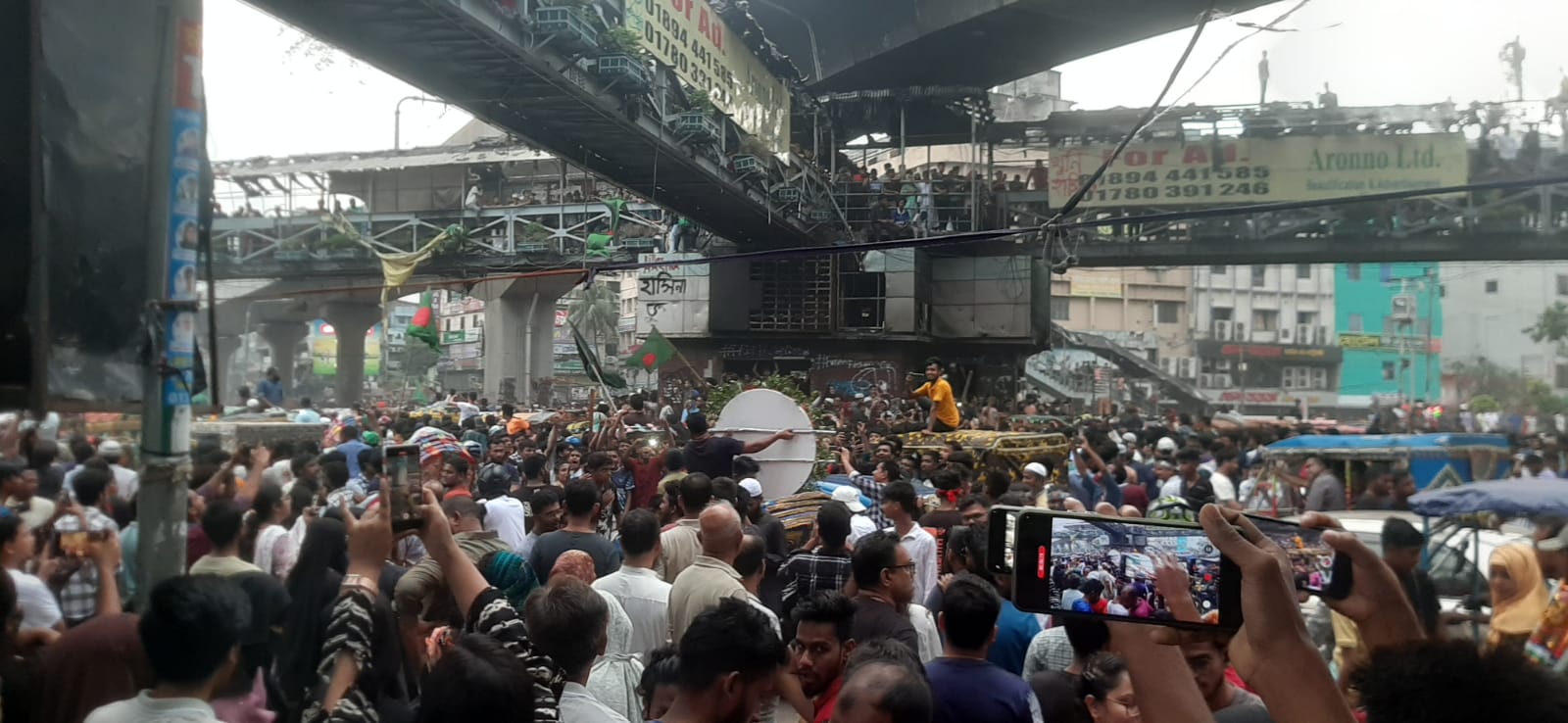Following Bangladeshi Prime Minister Sheikh Hasina’s resignation, Doha News spoke to expatriates in Doha and the Bangladeshi ambassador to gain a deeper insight.
Bangladesh’s Prime Minister Sheikh Hasina has resigned and fled the country following several days of unrest across the country, the head of the army confirmed on Monday via televised address.
Demonstrators have descended to the streets demanding the fall of the government for weeks, in a protest that started with students demanding an end to the recently reintroduced quota system for government jobs.
“I am taking responsibility now and we will go to the president and ask to form an interim government to lead the country in the meantime.” The Army Chief, Waker-Uz-Zaman said when announcing the Prime Minister’s resignation.
During the briefing, the army chief promised a probe into nearly 300 deaths that occurred during the deadly protests, assuring a more peaceful approach.
“Discussion is ongoing between the armed forces, main political parties and the student coordinators,” said Md. Nazrul Islam, Bangladesh’s Ambassador to Qatar.
“The leaders and the student coordinators are also calling upon the people to obey the government rules and regulations and be disciplined,” he told Doha News.
Thousands stormed the former Prime Minister’s office on Monday in retaliation to an aggressive crackdown on the recent protest. News reports on early Monday noted close to 100 could have been killed on Sunday night alone.
The domestic student-led protests were initially opposing a quota system that would allot 30% of government jobs to family members of veterans who fought for Bangladesh’s independence war in 1971.
“I didn’t think that the government would be toppled, they were successful in suppressing voices and quelling dissent for a long time,” said Ishfak Farhan Siyam, a Bangladeshi student based in Doha.
“But the brutal crackdown made the protests, which started with rightful demands against the quota system, turned into one asking for reforms and ousting the government,” Siyam added.
‘Nervous times’ for Bangladeshis in Doha
Mobile internet and 4G connections were repeatedly shut down since the protests began as a measure to curtail the movement, which affected expatriates in Doha too, said Md. Nazrul Islam, Bangladesh’s Ambassador to Qatar.
“The Bangladeshis could not easily contact home through online apps. Our software-based exports were hampered and the banking system did not operate for a few days causing huge difficulties to the people,” he told Doha News.
The internet shutdown was an attempt to quell dissent and hide the “torture and killing spree,” said Nahin Kabir, another Bangladeshi expatriate in Doha.
“Those were very nervous days,” Kabir said of the initial days of the protest. “[My family] could not contact us, send us messages, or post on social media. We only got to see the videos of brutal violence against fellow students in Bangladesh only after the internet came back up.”
Such deliberate isolation and brewing chaos also triggered a wave of demonstrations and solidarity protests around the world, including in Qatar and UAE.
Social media videos appeared to show members of Qatar’s Bangladeshi community taking to the streets in late July.
Qatar hosts 350,000 Bangladeshi expatriates and the two countries signed a new agreement to safeguard workers’ rights during Sheikh Tamim bin Hamad Al-Thani’s visit to Dhaka earlier in April.
“It is a proud moment for us, Bangladeshis, that we were able to speak up against an autocratic government, especially when it came from the students,” Kabir added. “The present has been written by the students and the youth.”
Jubilation in Dhaka
Following the announcement on Monday, people took to the streets to celebrate the fall of the government.
“I wasn’t born to witness 1971 when Bangladesh was liberated after a nine-month-long war, but this is probably what people must’ve felt back then,” said Farhan Saleh Rafid, a Bangladeshi undergraduate student based in Doha.
Rafid, currently in Dhaka for the summer, took to the streets to join the “march of happiness” as soon as the footage of Sheikh Hasina fleeing on a helicopter began circulating in local media.
“There is a crowd of at least 10,000 people in front of me, cheering and having the best moments of their lives. I cannot explain the joy I’m seeing in people’s faces here,” he told Doha News.
For Siyam, not being in his country to experience the “historic” occasion evokes a sense of regret.
“Everyone is in the streets, students, workers [and] the army. I decided to stay here, and I regret that. I’ve seen the country become this united for the first time, regardless of the ideology that people follow,” he said.
The road ahead
Hasina’s resignation has put an end to the violence, but the question remains on what comes next for the country.
The parliament will be dissolved soon to head to an election, the country’s President Mohammed Shahabuddin announced late on Monday, following a meeting with the military chief.
Nobel Peace Prize laureate Muhammad Yunus’ name has come up as the potential head of the interim government after a key student leader posted a social media video claiming Yunus had consented to the movement leader’s proposal.
Bangladesh is going for “freer and more fair” elections for a government elected by the people, according to the Bangladeshi ambassador.
“Immediate formation of an interim government will restore law and order. This will also ensure more freedom of speech,” he told Doha News.
While the change will not significantly impact Bangladeshi expatriates in Qatar, better incentives for migrant workers will help in “relieving them of further difficulties,” he added.
Toppling the government that “resorted to violence” and “suppressed voices” means a new dawn for many, including Siyam.
“A new, free Bangladesh will change everything for us,” he said.







